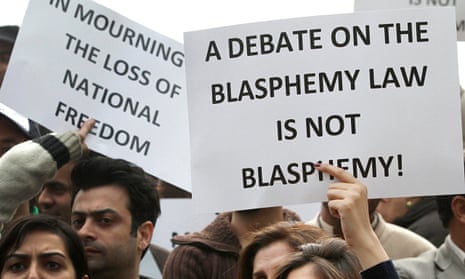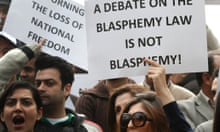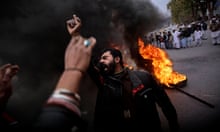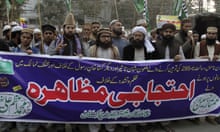An elderly mentally ill British citizen sentenced to death under Pakistan’s widely condemned blasphemy laws has been shot and injured by a policeman inside prison.
Mohammad Asghar was shot once in the back on Thursday inside Adiala prison in the city of Rawalpindi, where the 70-year-old from Edinburgh has been held since his conviction in January of blaspheming against Islam.
Asghar was rushed to hospital where staff said the bullet had “touched his ribs” but that he was not in a critical condition.
A prison source said a constable called Yousuf had managed to smuggle a gun into part of the prison where firearms are not allowed by concealing it in his sock. The constable was immediately arrested, as were four other prison officials suspected of negligence.
The UK legal charity Reprieve, which has been supporting Asghar, said the attack showed the only way to ensure his safety was for him to be returned to the UK.
Maya Foa from Reprieve said: “The UK government must redouble their efforts on this front – and as a first step, must urgently ensure that he is moved today to a safe location in Pakistan, until he is well enough to travel.”
On Thursday the high commission in Islamabad said it was providing consular assistance and had “raised our concerns with the local authorities at a senior level”.
Human rights campaigners and prominent British Muslims, including the Labour MP Sadiq Khan, have lobbied on Asghar’s behalf after the Pakistan-born British citizen was convicted under Pakistan’s notorious blasphemy laws.
Originally created by the British Raj and subsequently hardened by various Pakistani governments, the blasphemy laws are often maliciously used to settle personal feuds or to hound non-Muslim minorities out of their neighbourhoods.
Not only are blasphemy allegations nearly impossible to legally defend because of the difficultly of presenting evidence in court that might itself be declared blasphemous, they also often provoke mob violence and vigilante killings.
More than 50 people accused of blasphemy have been murdered before their trial was completed.
Asghar was arrested in September 2010 after being accused by a tenant with whom he was having a dispute of writing notes in which he claimed to be the prophet Muhammad.
His lawyers say they were banned from representing their client in the latter stages of the trial and that no consideration had been given to Asghar’s serious mental condition.
Four months before his arrest he was sectioned under the Mental Health Act and diagnosed with paranoid schizophrenia during treatment at Edinburgh’s Royal Victoria hospital.
After his release from hospital he travelled to Pakistan and stopped taking his medication.
Lawyers working with the UK legal charity Reprieve say Asghar suffered persistent delusions during the trial and was unable to properly defend himself. His legal team was later thrown off the case by the judge and a state-appointed legal representative failed to even raise the issue of Asghar’s schizophrenia.
Although an appeal was lodged in February the process has not yet begun and can take up to five years to commence.
Asghar, lacking medical attention and having also suffered a stroke, was said to be in a pathetic state and “barely lucid” while in prison.
In February a high-profile group of British Muslims appealed for the president, Mamnoon Hussain, to use his powers of pardon to free Asghar.
But showing any sort of leniency to people convicted of blasphemy is something few politicians care to risk in a religiously conservative country where the influence of Islamist radicals is only increasing.
Salmaan Taseer, a high-profile businessman and politician, unleashed a storm of controversy in 2011 when he called for the pardoning of a Christian woman accused of blasphemy and dared to criticise the law itself. He was subsequently gunned down in the heart of Islamabad by one of his own bodyguards, a man called Mumtaz Qadri, who is now widely regarded as a hero in Pakistan.
A popular mosque in a middle-class neighbourhood in the capital has even been named after Qadri.











Comments (…)
Sign in or create your Guardian account to join the discussion